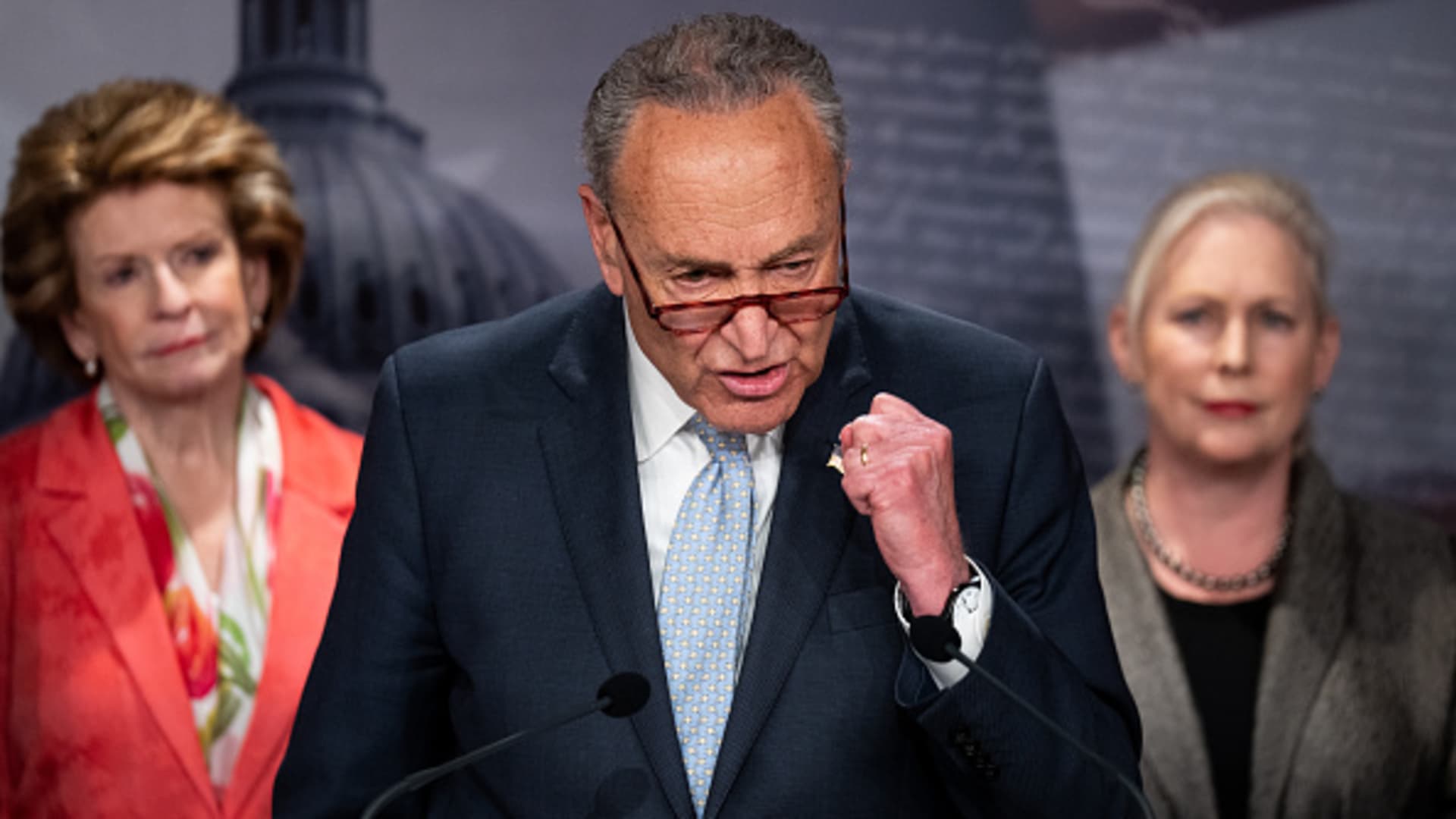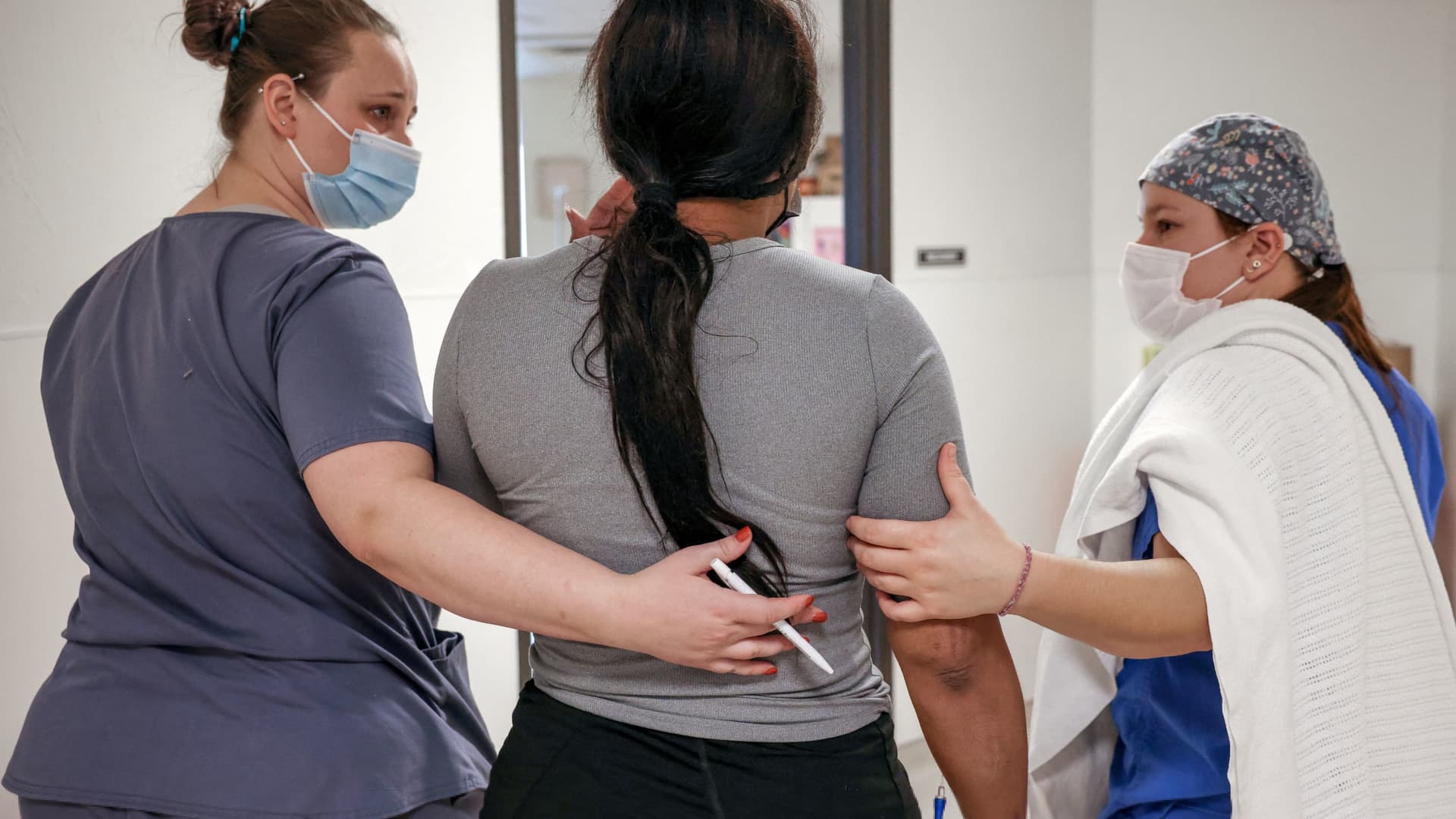Senate to vote on doomed bill to cement abortion rights as Supreme Court threatens to overturn Roe v. Wade decision
The vote to codify the Roe v. Wade abortion rights decision, which is doomed to fail, appears designed more to spur enthusiasm among Democratic voters.

Senate Majority Leader Chuck Schumer, D-N.Y., flanked from left by Sen. Debbie Stabenow, D-Mich., and Sen. Kirsten Gillibrand, D-N.Y., holds a news conference on Thursday, May 5, 2022, to announce the Senate will vote on the Women's Health Protection Act of 2022.
Bill Clark | Cq-roll Call, Inc. | Getty Images
Senate Republicans on Wednesday are set to block a bill that would make the Roe v. Wade abortion rights decision law, as Democrats scramble to preserve protections that the Supreme Court could soon toss out after nearly five decades.
Senate Majority Leader Chuck Schumer forged ahead with the Women's Health Protection Act of 2022, even as it appeared doomed to stall. After a draft court opinion that would overturn Roe leaked — inflaming the national abortion rights debate and energizing Democrats for November's midterm elections — the New York Democrat aimed to put every senator's stance on the record.
All Republicans in the Senate, which is split 50-50 between the GOP and Democrats, are expected to vote against advancing the bill Wednesday — leaving it short of the 60 votes needed to overcome a filibuster and allow a vote to proceed. One Democrat, Sen. Joe Manchin of West Virginia, opposed moving ahead with a similar bill earlier this year and has not yet revealed how he will vote Wednesday.
"Republicans who pretended disingenuously as if this moment couldn't possibly happen will have to answer to the women of America whose rights are about to be turned back by decades," Schumer said Tuesday on the Senate floor. "Tomorrow, there will be no more hiding. There will be no more distracting, no more obfuscating where every member in this chamber stands."
The bill would bar states from banning abortion before fetal viability — generally considered 24 weeks — and in certain cases after that point when a medical provider determines a pregnancy poses a risk to a person's health. It would also stop states from taking steps to limit access to certain drugs and abortion services, and ban governments from requiring medically unnecessary doctor's visits.
Democrats appear to have no path toward passing the bill, or a similar measure to cement federal abortion rights, unless they scrap the filibuster for legislation. Doing so would require only 51 votes to pass bills. At least two Democratic senators, Manchin and Kyrsten Sinema of Arizona, have signaled they will not vote to get rid of the filibuster.
For now, any push by Democrats to pass legislation appears designed to muster enthusiasm among voters who support abortion rights. Schumer doesn't have any Republican support for the legislation — even from Sens. Susan Collins of Maine and Lisa Murkowski of Alaska, considered the two GOP senators most likely to vote to protect abortion rights.
"Nothing's going to change. The vote's going to be the same," Murkowski said Monday, referencing her opposition to similar legislation that Republicans and Manchin blocked earlier this year.
Democrats have called on midterm voters to elect candidates who will vote to enshrine the Roe v. Wade decision into federal law as they risk losing their razor-thin majority in November's elections. In a statement after the draft decision leaked, President Joe Biden said, "we will need more pro-choice Senators and a pro-choice majority in the House to adopt legislation that codifies Roe, which I will work to pass and sign into law."
Democrats amplified their calls after Senate Minority Leader Mitch McConnell, R-Ky., told USA Today that a nationwide abortion ban was "possible" if the court overturned Roe. As the court's decision would leave abortion laws up to states, Congress would have to act to bar it at the federal level.
Republicans likely could not garner the 60 votes needed to overcome a filibuster and ban abortion in the U.S. even if they won Senate control in November. McConnell also told USA Today that he would not push to bypass the filibuster "for any subject."
McConnell on Tuesday downplayed the chances of his party trying to bar abortion nationwide.
"I think it's safe to say there aren't 60 votes there at the federal level, no matter who happens to be in the majority, no matter who happens to be in the White House," he told reporters. "So I think the widespread sentiment of my conference is this issue will be dealt with at the state level."
Still, the prospect of Republicans barring abortion nationwide strengthened the resolve of one Senate Democrat, Bob Casey of Pennsylvania, who has supported some restrictive abortion laws during his Senate tenure.
His father, the late Democratic former Pennsylvania Gov. Bob Casey, backed state abortion restrictions that made him a defendant in Planned Parenthood v. Casey — a 1992 Supreme Court case that further solidified abortion rights after Roe.
The younger Casey is one of the most conservative Democrats on abortion rights, previously backing a ban on terminations performed after 20 weeks. He voted earlier this year to start debate on the Women's Health Protection Act, but he didn't commit at the time to supporting the bill itself.
Casey on Tuesday said he would vote to codify Roe, as "the circumstances around the entire debate on abortion have changed" since the Senate last considered abortion rights legislation.
"In light of the leaked Supreme Court decision draft overturning Roe v. Wade, and subsequent reports that Republicans in the U.S. House and Senate will introduce legislation to enact a nationwide six-week ban, the real question of the moment is: do you support a categorical ban on abortion?" Casey said in a statement. "During my time in public office, I have never voted for — nor do I support — such a ban."

 Tekef
Tekef 






























.jpg&h=630&w=1200&q=100&v=6e07dc5773&c=1)